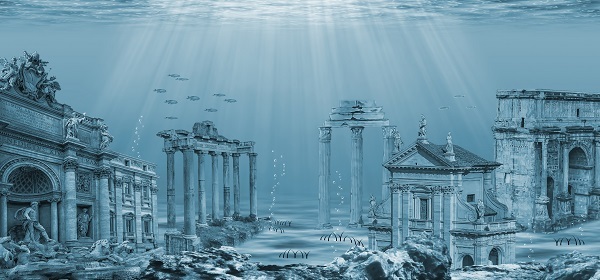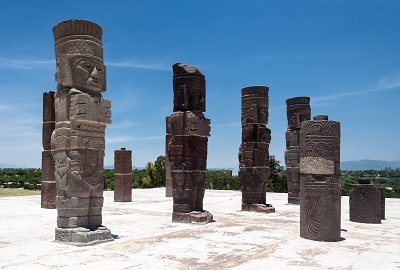

Atlantis is a mythical island mentioned in Plato’s famous work, "Timaeus and Critias." It is a 2,400-year-old fascination. Plato described it as a powerful nation that perished in the middle of the night.
It is a larger landscape located beyond the Pillars of Hercules, assumed to be located to the west of the Strait of Gibraltar in the Atlantic Ocean. Modern-day scholars believe the Greek island of Santorini to be Plato’s Atlantis.

Plato's Atlantis is believed to have existed around 360 BC; according to him, the founder of Atlantis is the demigod Poseidon, who founded utopian civilization. He made his son Atlas to be the king of Atlantis and its surrounding islands.
According to Plato, Atlantis had a vast landscape i.e.Libya and Asia Minor combined together was the landscape of Atlantis.
The Utopian civilization had its own constitution, which mirrored his political ideas and theories. It had a variety of cultures, and the people of Atlantis lived with high morality on the right path.
Their houses were separated by wide moats and linked by a canal that connected all of the city to the centre. It is said that Atlantis had gold, silver, and other precious metals. It was rich in nature and wildlife, with a great capital city at its centre.
The central island was the capital of Atlantis, and it is believed that Atlantis had great naval power; its armies conquered Africa, Egypt, and Europe up until Italy.
As with all civilizations, utopian civilization started to decline after its peak period. The morality of the people and government started to decline, and civilization started to fall apart.
As the civilization was driven by divine power, it is believed that Atlantis was punished for its immorality, and the island was struck by earthquakes and floods and sank into the sea.
Plato's dialogue character, Critias learned of Atlantis from his grandfather, who learned of it from an Athenian statesman Salon. Salon learned about the existence of Atlantis from an Egyptian priest, who stated that it occurred 9000 years ago.
The search for Atlantis began in the early 15th century, and we never stopped looking for it. Explorers from the 15th to 17th centuries were eager to discover the ruins of lost civilizations and cities such as the Maya, Aztec, and Incan. The expeditions for Atlantis were done in the Middle East, Tibet, and even Antarctica.
According to Orser, the people of Atlantis lived a developed life with high morals and spirituality.as these rational people started to become selfish, greedy, petty, and morally bankrupt, which made gods angry and punished them by turning them into immoral pursuits. As punishment, the gods sent earthquakes and fire on a terrible night that caused Atlantis to sink in the sea.
Strabo recorded Aristotle’s joke on Atlantis, where he stated, "Plato has the ability to create nations out of thin air and destroy them in a day."
Robert Ballard, who was a great ocean explorer, believed in Plato's Atlantis, and he states that the existence of Atlantis is logical and has many similarities to our history of destruction. Though he believed in the existence of Atlantis, he did not agree with the view that Santorini was Atlantis, as the timeline of its destruction does not match the timeline of Atlantis end as mentioned in Plato’s dialogues.
Rome believed Atlantis was created to support the ideas and theories of his own, and it was a tool of Plato to convey this philosophical thinking.
Plato’s ideas on divine versus human nature, ideal societies, and the gradual corruption of human society were reflected in Atlantis.
Atlantis is still a hot topic for discussion about its existence. People come up with theories to prove and disprove its origins and tales.  Many scholars attempted to locate Atlantis by tracing the map from Plato’s writings, as it is the only known evidence that talks about its existence clearly. It is up to the explorers and readers to believe in its presence and do research on it. It got a boost from fictional writers, travellers, and researchers and reached the public with a huge set of imaginations.
Many scholars attempted to locate Atlantis by tracing the map from Plato’s writings, as it is the only known evidence that talks about its existence clearly. It is up to the explorers and readers to believe in its presence and do research on it. It got a boost from fictional writers, travellers, and researchers and reached the public with a huge set of imaginations.
Q1. What are different theories about Atlantis?
Ans.
According to fictional writers, it was swallowed by the Bermuda Triangle.
Atlantis was in Antarctica.
It is a mythical version of the story of the Black Sea Flood.
Q2. Name a few famous works on Atlantis.
Ans. Donnelly’s "Atlantis: The Antediluvian World," Francis Bacon’s "The New Atlantis," and Helena Petrovna Blavatsky's "The Secret Doctrine."
Q3. What are the rituals practised in Atlantis?
Ans. Bull-baiting, sacrifices are the rituals practised in Atlantis which was similar to athenians.